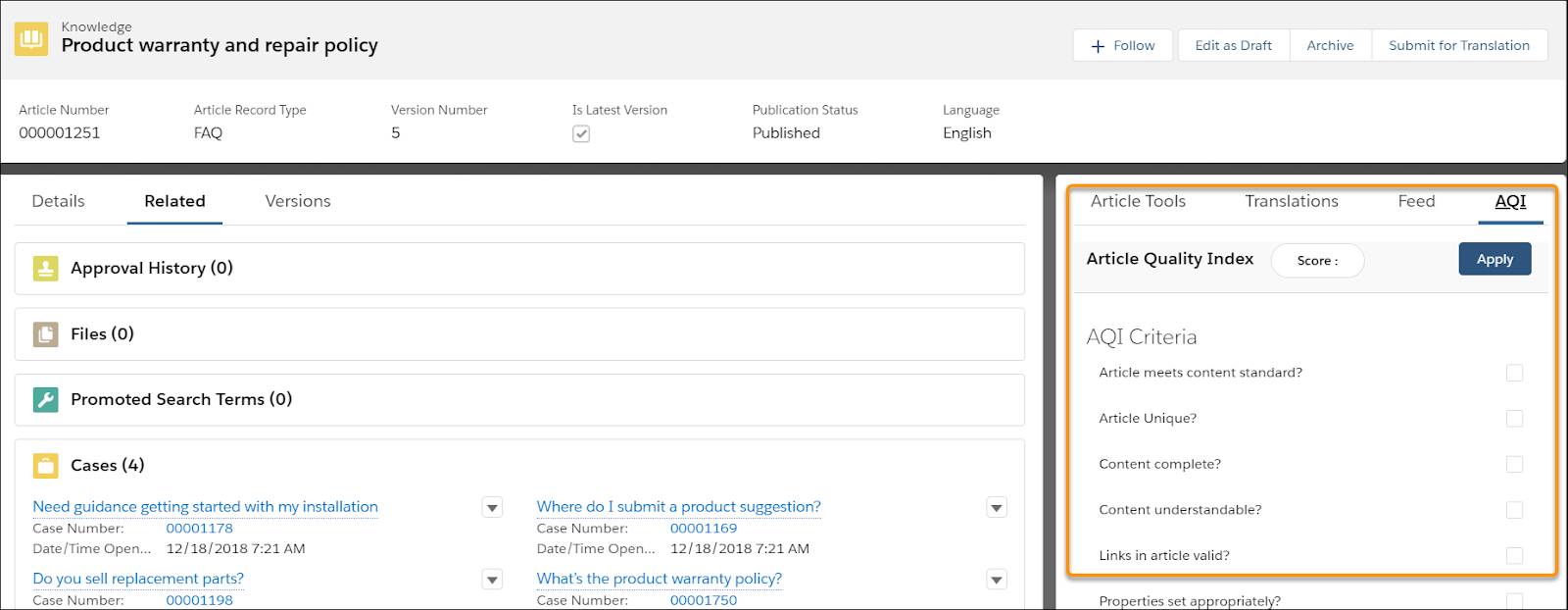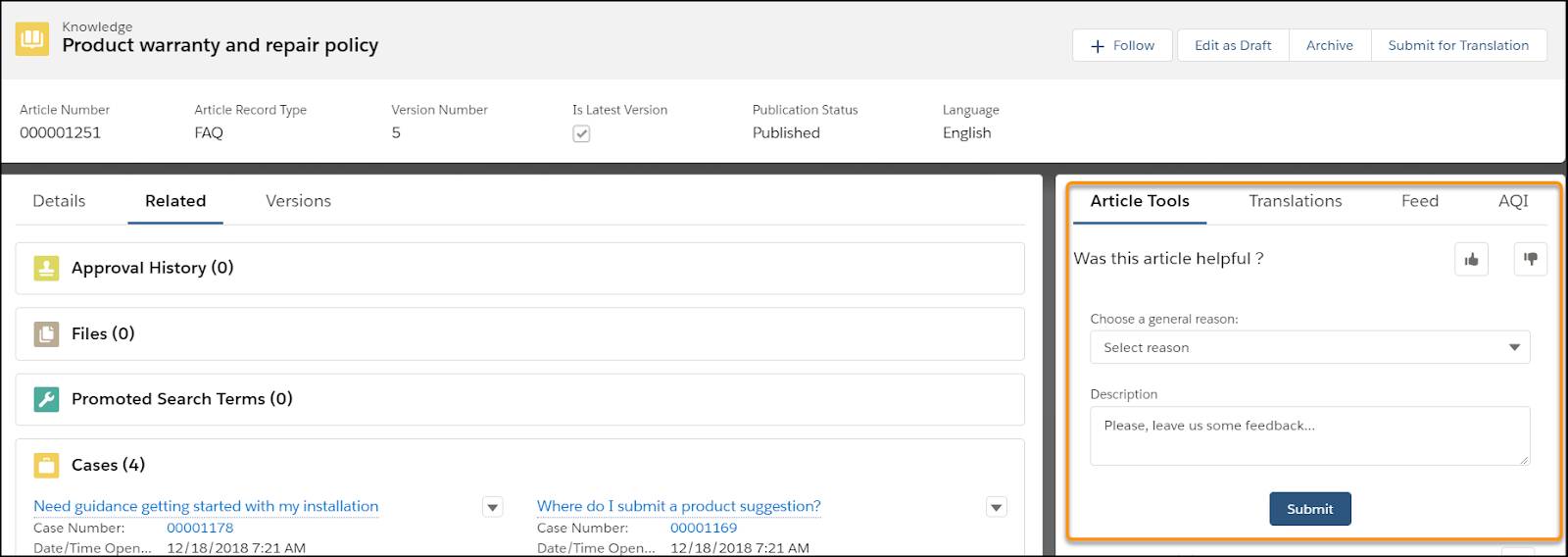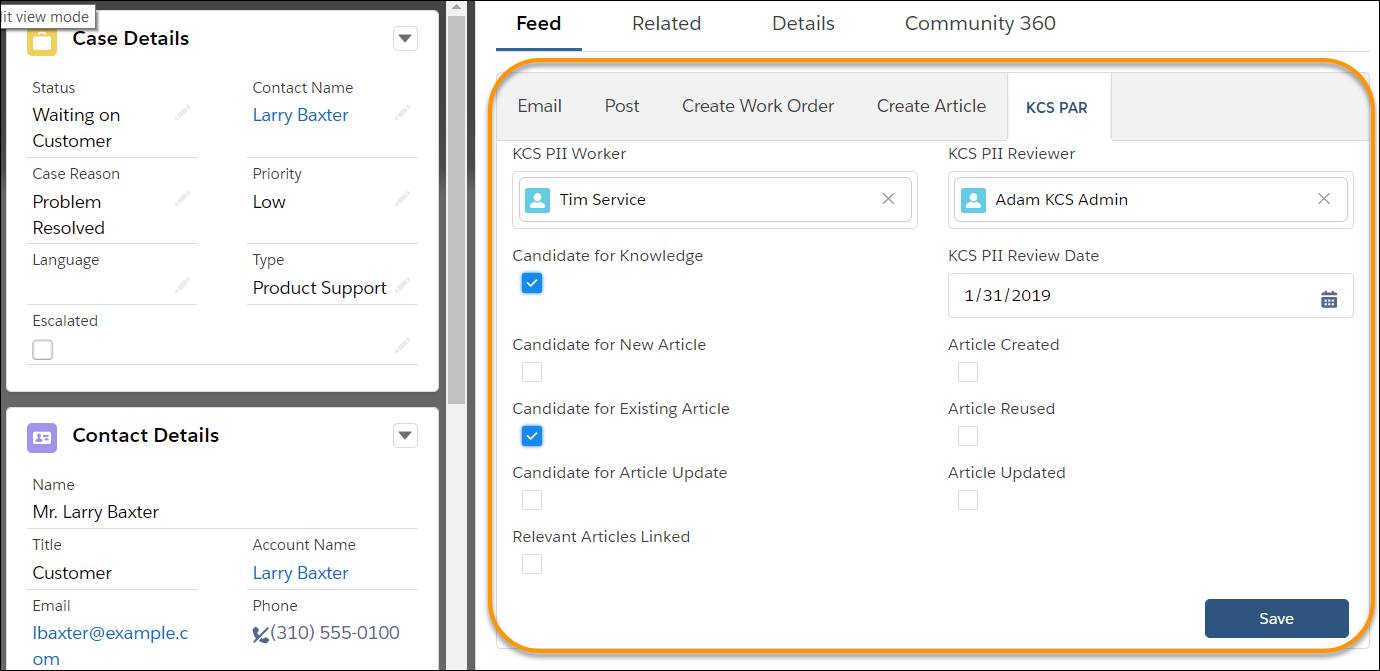Optimize Article Search and Quality Audits
Learning Objectives
After completing this unit, you’ll be able to:
- Describe how to help agents find the right articles.
- Enable Suggested Articles on cases.
- List the responsibilities of a KCS Coach.
- Install AppExchange apps to make it easier to monitor article quality and agent performance.
Find the Article You Need
Part of an agent’s job is finding information to help customers. If the information isn’t there, then agents must determine that quickly, too. The most common method agents use to find articles is by using search in the knowledge component. So the best way to speed agents along is to optimize search.
Luckily, Maria and Ada have been working together to fine-tune search ever since Ursa Major created its knowledge base. Maria follows the tips and tricks in the Knowledge Search Basics Trailhead module. She’s created a terrific search experience for her team.
Maria also set up data category groups and categories to organize information so that it’s easier to find. She’s created a data category group to organize articles by support teams: residential solar installations, commercial solar installations, and individual solar components.
Maria added next level down data categories. For the residential group, that includes categories such as solar hot water heater installations and whole house solar systems. For more information on best practices for data groups and categories, head over to Prepare Your Salesforce Knowledge Base.
Enable and Set Up Suggested Articles
In the best case scenario, agents don’t need to search for the most relevant article at all. It appears in the list of suggested articles in the knowledge component based on keywords in the customer’s case.
When agents see a list of articles, they can hover on an article title to view the article in a pop-up. Or they click the article to open that record as a subtab on the case. If the article is useful, they attach it to the case. All without having to search at all.
Now Maria sets up the case fields that should be used to determine which articles to suggest. For example, if she chooses Product, articles with the same product name show up in the Suggested Articles list.
- Click
 and select Setup.
and select Setup.
- Enter
Knowledge Settingsin the Quick Find box, then select Knowledge Settings.
- Click Edit.
- Select Suggest related articles on cases.
- Select the case fields to use for your search. Maria selects Subject. Note that Case Description is always used so it’s not in the list of fields to select.
- Click Save.
Monitor Adoption and Article Quality
Ada knows that the most important part of KCS methodology is making sure agents have correctly adopted KCS processes. At first, Ursa Major intended to provide training and go from there. But after seeing studies that indicate using a Coach makes organizations much more successful at implementation, Ursa Major tapped Zhang Wei as KCS Coach.
Zhang has extensive experience in KCS implementation, acting as a KCS Publisher, and working as a support agent for Ursa Major.
All agents are trained on the new processes, and it’s Zhang’s role to mentor and support individual agents as they start to use them. He also helps determine when agents are ready to move to new KCS roles. That’s based on how well they’re doing at capturing customer information, writing good articles, and using them when appropriate to resolve cases more quickly.
Zhang uses process adherence review (PAR) to measure how often and how well agents are following the KCS workflow. PARs aren’t about tracking goals like the number of articles created by an agent. Tracking goals on activities can lead to trouble. For example, if agents have a goal to create the most articles, they might start creating many low-quality articles.
Instead, Zhang analyzes an agent’s judgment. One of his tasks is monitoring how well agents use the knowledge base to solve cases. He studies his team’s cases and asks these questions.
- Was the case a good candidate for an article?
- Was there an existing article that would have been useful for the case? If so, did the agent find it and attach it?
- Did the agent link to all relevant articles?
- If the agent created an article, was the article necessary?
- Is the article being used for other cases?
- What kind of feedback is the article getting?
He also discusses ways to flag articles to fix when needed. Not everyone can fix an article when they find a mistake. Sometimes an agent discovers a mistake while in the middle of an unrelated case, or sometimes an agent isn’t yet trained to edit articles. But it’s important to capture that feedback to make sure it doesn’t get lost, and that action is taken to make the fix.
Monthly quality audits are a key tool to monitor article quality and how well agents are using the new processes. Zhang wants tools that can support him in his quest for KCS excellence.
Add Functionality Using AppExchange
Maria knows she can set up the Ursa Major org to meet Zhang’s requirements. But it takes time to build so much functionality from scratch. Fortunately, she knows just where to go to get help—the AppExchange.
AppExchange is the Salesforce store. It’s the marketplace for all things Salesforce, including apps, Lightning components, and more. Maria heads over to see if there are any apps she can use to speed up her KCS adoption. She discovers solutions that provide exactly what she’s looking for.
-
Content Standard Checklist for Knowledge. This free managed package ensures that the team can audit agents’ article creation and usage. Zhang is excited to use this tool to evaluate each article and find opportunities for coaching. The tool also offers reports to help Zhang track individual, group, and organizational article quality trends across time. Maria makes a note to add it to its own tab on the page layout for the article record home page. She also makes sure it’s only visible to KCS Coaches.

-
Knowledge Article Feedback. This free component helps you collect feedback on article content and manage feedback resolution. Agents enter feedback about the article into the component. The article feedback is sent to a custom Article Feedback object for tracking and assignment to make sure that someone follows up to address it. The object tracks feedback entered into the feedback component (which can be added to the internal app and the community) and posts tagged with a specific hashtag (like #articlefeedback). Maria adds it to the article record home page.

After Maria reviews the documentation on these managed packages, she tests them in a sandbox. If she likes what she sees, she installs them to Ursa Major’s production org. When the Lightning components are there, she grants access to Zhang and other agents.
Create Your Own Assessment Tab
Zhang is excited about the packages. He asks Maria if she can create something to help him see if agents are following best practices for case management. Something like the AQI package, but for cases. Then he can audit individual cases to be sure the KCS process was correctly followed without using an external tool, like a spreadsheet. It makes his monthly audits much easier.
Maria creates a tab on the case record home page with key fields that Zhang wants to track. She uses the questions he asked about KCS processes as a guideline. At Zhang’s request, she names it KCS PAR. Reports can be created on this information to track the trends of how effectively agents or groups of agents are using the KCS methodology to resolve cases. Here’s what it looks like when she’s finished.

Maria has optimized search and data categories to help agents find the right article for a case. She enabled Suggested Articles so agents often won’t even have to search. Then she installed managed packages and a custom Lightning component to help the KCS Coach audit the quality of articles and case management.
Resources
- Trailhead module: Knowledge Search Basics
- Trailhead module: Knowledge Basics for Lightning Experience
- Salesforce Help: Enable Suggested Articles to Solve Cases
- Trailhead module: AppExchange Basics
- AppExchange package: Content Standard Checklist for Knowledge
- AppExchange component: Knowledge Article Feedback
- KCS Article: KCS Content Health Indicators